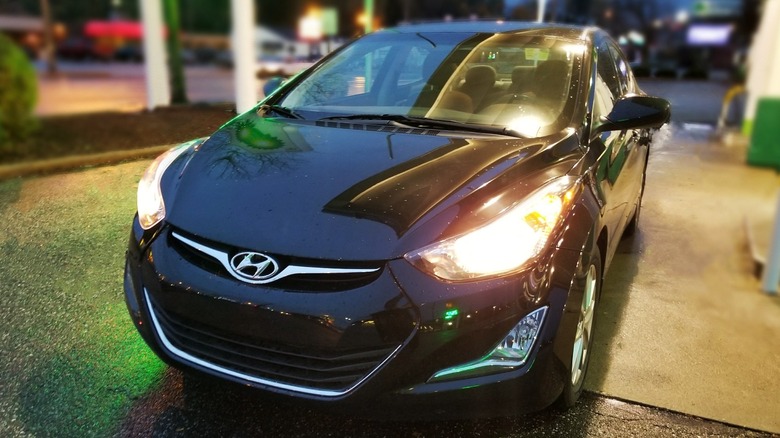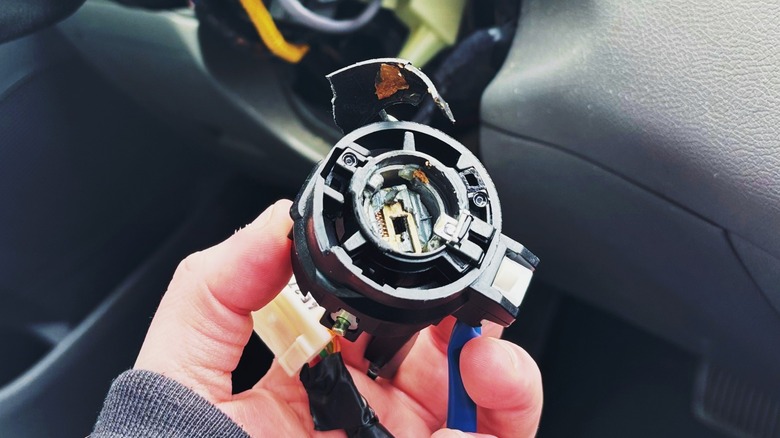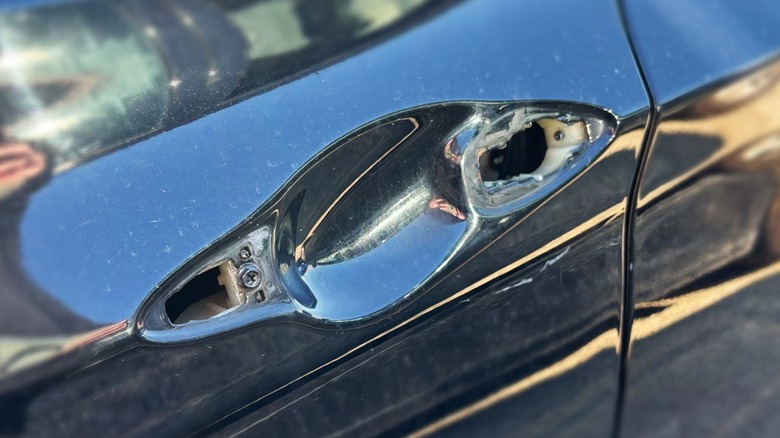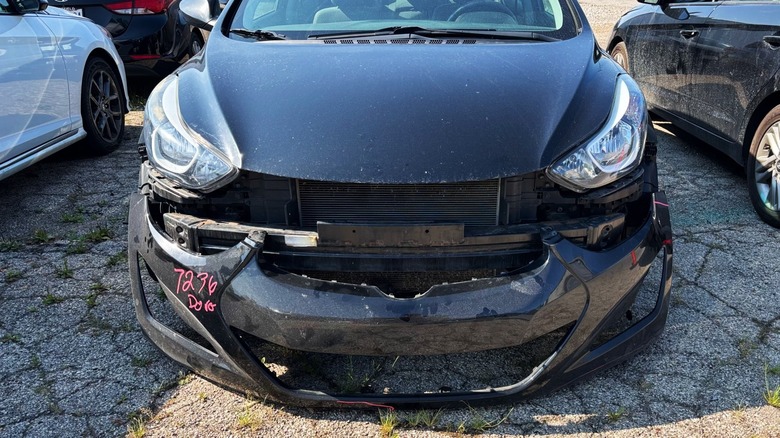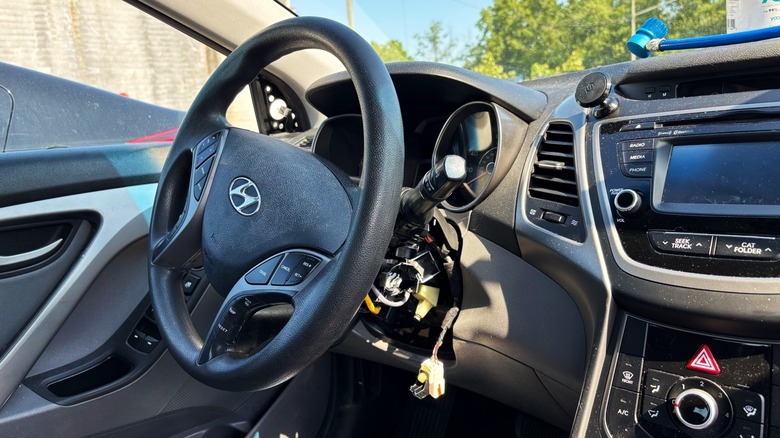The 'Kia Boys' Stole My Hyundai, Here's What Happened Next
On an entirely unremarkable Monday morning, I was helping my grandmother get ready to visit a friend when someone knocked on my door. Upon opening it, I was greeted by a city police officer whose first words were, "Don't worry, you're not in any trouble." That, paradoxically, is not a comforting statement; it hits with the same believability as a doctor claiming the thing they're about to do will only feel like a pinch. A discombobulating 60-second conversation ensued, during which I gathered that something was going on with my car, except I wasn't quite sure what.
After putting on my shoes and taking a short trip down the elevator, I stepped into the parking garage to see that my assigned parking spot was empty. Only a few spots over, a neighbor's car — one that just so happened to be the same make and model as my 2015 Hyundai Elantra — had its driver's door handle partially peeled off. It turned out that a teenager had stolen my car in the middle of the night using a method popularized on TikTok called the "Kia Challenge." The resulting joyride caused approximately $10,000 in damage.
Who the heck are the 'Kia Boys?'
In 2021, some cities in the U.S. reported an unusual increase in the rate of car thefts involving Hyundai and Kia vehicles. Over the coming months, the reason for that problem became clear: certain key-start vehicles sold by Hyundai in the United States lacked a now-common feature called an immobilizer. Without that inexpensive security component, anyone with access to a vulnerable Hyundai or Kia could open up its steering column, slide out the ignition switch, and then use an ordinary USB stick or charging cable to start the vehicle.
News of this vulnerability spread like wildfire on TikTok, where teenagers across the country learned that it is surprisingly easy to steal a car and take it for a spin -– something that has since resulted in several deaths and potentially half a billion dollars in damages. Many cities across the U.S. — including my own — have filed lawsuits against Hyundai and Kia over the burden caused by the TikTok challenge. Some insurance companies have stopped insuring these vehicles. A class action lawsuit resulted in a settlement that'll see Hyundai at least partially reimburse victims for some of their out-of-pocket costs related to a car theft — though for many people, it won't fully make up for the expenses and hassle that result.
Preventative measures can only do so much
My car had a functional alarm system when it was stolen — and it didn't go off at any point during the ordeal. The reason, one of the police officers explained, is that it's possible to get into these models without setting off the alarm by removing the door handles. That's exactly what happened with my Elantra, which was recovered with its driver's door handle completely missing.
While there are ways you can (probably) prevent your car from being stolen, they don't address the root of the problem: these specific Hyundais and Kias are targeted by car thieves, and those same thieves have no way of knowing whether a security add-on has been installed just by looking at the vehicle. You may have spent a few hundred dollars having a hidden kill switch installed — or perhaps you're one of the drivers who pull the starter relay every time they park — but that won't prevent a thief from physically breaking in and cracking open the steering column.
Even if your vehicle is ultimately left where you parked it, the attempted theft could result in hundreds or thousands of dollars in damage, not to mention the risk of an increased insurance premium. Hyundai will reimburse you for at least part of the cost of a steering wheel lock, but such contraptions are little more than a visual deterrent — one that a well-prepared "Kia boy" can remove in seconds using a simple hacksaw. What about the software security update Hyundai is installing on some of these models as part of a recall? Many drivers had the software update installed, only to have their cars stolen regardless.
So, someone stole your Hyundai. Now what?
Standing in your unexpectedly empty parking spot is a terrible time to realize you have no idea what happens next when a vehicle is stolen. The good news is that both your local police and insurance company will guide you through the process. Things start with law enforcement, as you'll need to report your vehicle stolen (and depending on where you live, you may also need to let the DMV know). From there, you should call your insurance company to file a claim. If the car hasn't been found yet, a long waiting period starts — typically 30 days, though your own policy may differ. If the vehicle isn't recovered by that deadline, insurance may cut you a check for the value of the car minus the deductible.
If it is recovered, things get more complicated. Assuming you have full coverage insurance and not just state minimum liability, you'll have to arrange to have your vehicle towed from its first destination — likely a city impound lot — to a repair shop tasked with determining how much damage was caused and what it'll cost to fix it. You get to pick the shop, but if you don't already have a place in mind, the insurance company will advise that you have the car towed to the nearest Hyundai dealership with a service center. Some dealerships work alongside a local body shop to repair cars that need more extensive work done, which could mean having to arrange a second tow.
Moving at the speed of insurance claims
Though insurance moved quickly when I first filed the claim, things slowed down considerably after that, and a few days passed without any sort of status update. The following week, I received the first call from my insurance adjuster, who'd taken a look at the car and gotten the initial repair estimate. I was told that I had to take a trip to the auto shop myself to drop off the keys and sign some paperwork. I also had to look over the car and report back with any noticeable damage that wasn't on the initial estimate. That's when I got my first post-theft look at the Elantra.
The teenage thief and his friend probably used the vehicle to go on a joyride, the police said, and I could see the evidence of that. The burnt remains of a few marijuana cigarettes were left on the console and empty junk food wrappers covered the passenger side floor. They'd trashed the inside of the car while searching it for items to steal, and at some point during their trip, they managed to tear off the front bumper and split the rear bumper, among other things. As a bit of perhaps unintentional salt in the wound, they also left behind the USB cable they'd used to start the car.
Following a thorough inspection, the auto shop concluded that the cost of repairs would exceed the vehicle's value. Insurance told me to release the car so that they could tow it to a salvage lot, and after I signed the title over to the company, they printed me a check to pick up at their local office. The entire process, from start to finish, took two weeks.
Hyundai may send you a check, but it could take a while
If you live in the United States and someone steals your eligible key-start Hyundai or Kia vehicle, you can file for reimbursement from Hyundai Motor America, though it may ultimately only cover a portion of your out-of-pocket expenses related to the theft. Payments will be made to victims as part of the revised settlement addressing a class action lawsuit filed over these TikTok-adjacent thefts. There are some major caveats involved with this, however, the first of which is that payments will only be issued if the court accepts the revised settlement. That announcement is scheduled to arrive any day now — as of this writing –though it's impossible to say what the outcome will be. Also, you must file your claim by January 11, 2025.
Information on the settlement can be found on the Hagens Berman law firm's website, and victims of theft can file a claim on the dedicated Hyundai Theft Settlement website (there's also a version of the website for Kia owners). If you live in the U.S. and owned your vulnerable Hyundai or Kia vehicle prior to March 2024, you'll have also received a paper packet in the mail that included forms you can manually fill out and mail back; those same forms can also be downloaded as PDFs from the settlement website. Benefits potentially available include partial reimbursement of the total loss of a car, reimbursement up to a certain threshold for costs related to damage and lost personal property, up to $375 toward an increased insurance premium or the deductible you had to pay related to the theft, and more.
